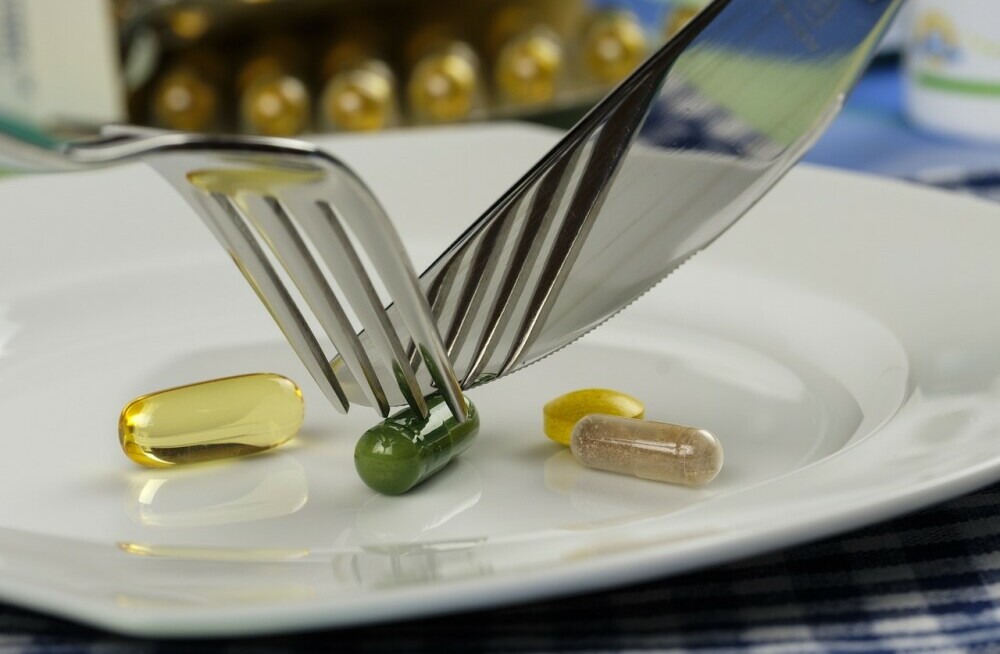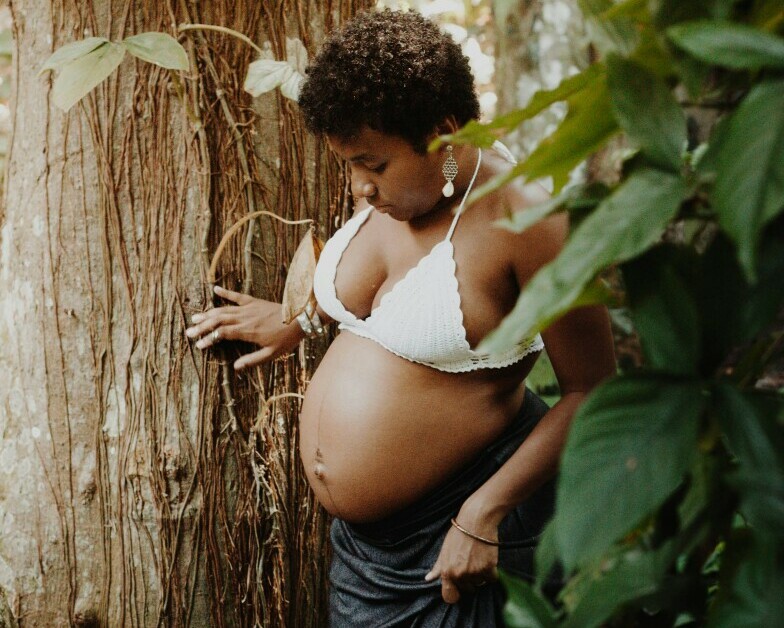
Pregnant women eat for two! But is this really true? And are there really pregnancy vitamins? Let’s tackle the subject of nutrition during pregnancy and set the record straight: it’s not that complicated. In this article, you’ll learn everything you need to know.
PREGNANT WOMEN NEED MORE VITAMINS: TRUE OR FALSE?
Suddenly everything changes: Due to physical and hormonal changes, a pregnant woman’s body has a lot to do and goes through very different phases during pregnancy. These changes rarely go unnoticed.
Typical physical symptoms such as nausea, skin problems, back pain, heavy legs and fatigue are unwelcome, but many pregnant women suffer from them. Not to mention the emotional and psychological challenges women suddenly face.
Clearly, the body needs some support for this unique new role. You can do this emotionally by listening to it. Give yourself time to accept all the changes, and give yourself a break whenever you need it. What you’re going through is no small thing, and can even be confusing at times.
On a physical level, your diet plays the most important role. It needs to be balanced and include as many nutrients as possible. Because now you’re not only taking care of your own body, you’re also creating an environment in which a baby can grow. You both need a lot of nutrients. But what does that mean? Do you need to change your diet and take lots of supplements? As is often the case in life, there’s no one right answer.
Contrary to popular belief, the need for micronutrients, such as vitamins, and macronutrients, such as fats and carbohydrates, does not double. When it comes to vitamins and minerals, there are a few that you should pay special attention to during pregnancy and breastfeeding. These include iodine, folic acid, omega-3 fatty acids, and iron, as some of these help the body form tissues and are also necessary for the fetus. There is often a deficiency before pregnancy, which of course increases the need.
While the need may vary from woman to woman, and each woman will want to decide for herself, there are some guidelines that can help you as an expectant mother.
In summary, the assumption that pregnant women, breastfeeding women, and women who are trying to become pregnant need more vital substances here and there is not entirely wrong. However, it is important to find a quality source and not to overdo it. A detailed discussion and examination by your gynecologist will help determine what is best for you.

NUTRITION DURING PREGNANCY
As the foundation of your health, nutrition is especially important during pregnancy and while breastfeeding. Let’s start with the basics: if you’re eating a balanced diet, you don’t need to make many changes.
During pregnancy, you should include more foods from each of the food groups in your daily diet. According to the German Nutrition Society (DGE), this means plenty of vegetables, fruits, legumes, and whole grains. Fresh plant foods should be at the top of your shopping list right now because they are nutrient-dense and your body absorbs a variety of essential nutrients even in small amounts.
On the other hand, you need to limit your consumption of animal foods and avoid sweets and industrially processed products as much as possible. The latter are often full of sugar and saturated fats, which can have a negative impact on your body’s health.
So it’s important to make sure you’re getting enough nutrients, and that you’re getting them from natural, organic sources.
Is a Vegan Pregnancy Healthy?
Do you eat vegan but have doubts about eating vegan during pregnancy? In general, plant foods are the best and most valuable source of nutrients. Of course, especially during pregnancy and breastfeeding, you need to be aware of the vitamins and minerals that you can’t get from food as a vegan. These include vitamin B12 and omega-3 fatty acids, or their active forms, DHA and EPA. These are especially important because they are found primarily in animal products. In general, it’s a good idea to supplement your diet with natural supplements…
THESE FOODS WILL PROVIDE YOU WITH SUFFICIENT INTAKE DURING PREGNANCY AND LACTATION.
Taste, preferences, tolerance, etc. generally determine our eating habits. These can change during pregnancy. But some foods are very important because they contain many valuable nutrients that your body can use during this time.
Fluids
It’s important to drink plenty of water, as well as herbal and fruit teas. The increased need for fluids is related to several factors. Blood volume increases during pregnancy, requiring more fluids. You also lose more fluid, so you sweat a little more. What’s more, your skin, bowels, and mucous membranes welcome an extra glass of water to keep you digestive, cheerful, and glowing.
Vegetables, Fruits and Legumes
Your diet should consist mainly of vegetables, fruits and legumes, especially during pregnancy. They contain a particularly high nutrient density, which you need now.
As for legumes, it depends on your personal tolerance, but if they don’t cause you any problems, don’t hesitate to eat them. By the way, it is said that legumes are easier to digest if they are marinated.
But there are no real prohibitions. However, you should make sure that raw vegetables in particular are washed thoroughly. Pesticides and other residues can cross the placental barrier and enter your baby’s body. To protect yourself and your baby from germs, avoid ready-to-eat salads, pre-cut fruits and vegetables, and uncooked sprouts. Instead, choose natural, organic foods.
See our Favorites at a Glance:
- Spinach
- Green Kale
- Broccoli Flower
- Eggplant
- Green Peas
- Fennel
- Swiss chard
- Carrot
- Beet
- Sweet Potato
- Apricots
- Baked Apples
- Blackberries
- Nuts, Almonds
WHAT ABOUT CRAVINGS?
As you now know, you don’t have to eat for two, but what about uncontrollable cravings?
What is often considered a typical « hormonal response » of pregnant women may have a deeper meaning. For example, hormonal changes may explain why you suddenly can’t smell the things you really like.
Our bodies know exactly what they need and send us signals accordingly. Cravings can be seen as one such signal. Specifically, this can mean cravings for chocolate and sweets. In addition to the happy hormones that chocolate can produce, sugar helps to raise blood sugar levels. Blood sugar levels are often lower during pregnancy, which leads to a need for more energy.
Many people are also familiar with salty cravings. And it’s not just during pregnancy: you may be familiar with this phenomenon after a night out. My kingdom for a pizza! The body then lacks minerals (electrolytes), especially sodium, which is present in all salty foods.
A strong craving for fruit may indicate a vitamin deficiency. The need for vitamins increases slightly during pregnancy. Fruits and vegetables also naturally contain water, so this may simply be a sign of thirst.
FOLIC ACID, IODINE, OR VITAMIN D: YOU NEED THESE VITAMINS DURING PREGNANCY.
Nutrition is essential, especially during pregnancy and breastfeeding. But what happens if your diet doesn’t meet your needs? In most cases, your needs don’t double right away, but you do need to pay special attention to certain nutrients. We’ve listed them for you here:
Iodine and Folic Acid
Iodine and folic acid are often recommended as a precaution if you’re planning to have children. In fact, they play an important preparatory role in the physical development of both mother and child. For example, they contribute to the growth of maternal tissues and can help reduce fatigue. In addition, sufficient iodine is essential for healthy thyroid function. Blood formation, cell division, and the immune system as a whole depend on iodine and folic acid not only during pregnancy. Together, they also contribute to the normal growth of children.
In fact, the need for these nutrients is greatest during pregnancy and lactation.
Omega 3 (DHA)
In general, we need essential fatty acids for all of our body’s processes. Since we can’t produce them ourselves, we have to rely on an adequate external supply. They are practically only found in fish. The active form DHA plays an important role in the diet during pregnancy and lactation. Together with the other active form, EPA, they can help in the following areas
Vision development in young children
Normal eye development in the fetus and breast-fed infant
Normal brain development in fetuses and breast-fed infants
About Iron
This essential trace element is found in almost every cell in the body, so it plays a central role in your overall energy balance. So it’s clear that your body doesn’t need to suffer from iron deficiency during particularly difficult times. In particular, iron can have a normal effect on the immune system, cell division, blood formation, and energy metabolism. It also helps to reduce fatigue.
In general, many women suffer from iron deficiency, not just during pregnancy. Your gynecologist will be able to determine the extent of your deficiency and recommend a dosage for your pregnancy.
According to the DGE, 15 mg per day is generally recommended for women. However, this varies greatly during pregnancy and lactation:
During pregnancy: 30 mg/day
During lactation 20 mg/day
About Zinc
Although zinc is found in many foods, zinc deficiency is not uncommon. We need this essential trace element daily because it plays a crucial role in metabolism. We cannot produce zinc or store it in large quantities. During pregnancy, zinc is especially important for cell growth. In this way, it actively helps the body to develop new life. Zinc also plays an important role in the immune system and contributes to normal fertility and reproductive capacity, so it’s a good idea to take it even if you’re planning to have children.
Sango Coral
When we’re deficient in certain minerals or electrolytes, our bodies can respond with cravings. Calcium and magnesium are particularly important, and we should generally get enough of them. However, this is not always guaranteed and can be due to eating habits, nutrient-poor foods, or an increased need, for example, as a result of pregnancy. Calcium and magnesium play an important role in many metabolic processes. Whether it’s bones and teeth, blood clotting, the nervous system, or reducing fatigue, it’s a winning team.
Vitamin D3 + K2
These two are especially important for the immune system. Vitamin D3 also plays a role in cell division, which is important during pregnancy. Together, vitamins D3 and K2 contribute to strong bones and optimal calcium utilization. Both are often deficient because it’s not easy to get them from food. We make vitamin D3 from sun exposure, but that’s a problem when there’s little sun and lots of sunscreen. Vitamin K2 is mainly found in fermented foods, which we rarely eat. If you’re pregnant and have a deficiency, there’s a good chance your baby will too.
Macronutrients
Macronutrients include carbohydrates, fats, and proteins, which the body uses for energy. During pregnancy, these nutrients should not be consumed indiscriminately, as the need for them does not actually increase as much as many believe.
For pregnant women, this means
2nd trimester: 250 kcal more per day
3rd trimester: 500 kcal more per day
And, according to the DGE, that’s if you’re at normal weight and your physical activity level remains the same.
Breastfeeding increases the requirement by about 500 kcal per day for the first 4 to 6 months.



2 réponses à “Supplements During Pregnancy? What You Really Need And What To Watch Out For.”
Very good article!
Thank you!